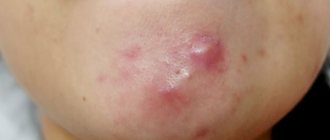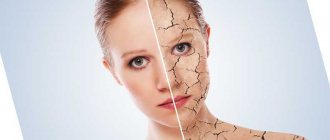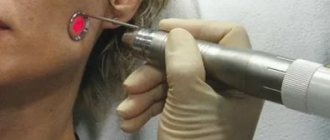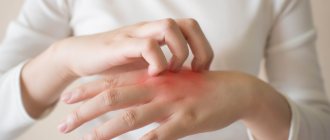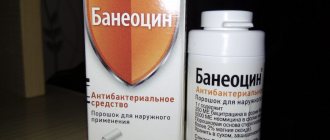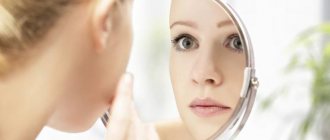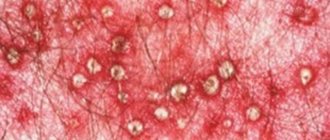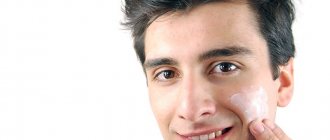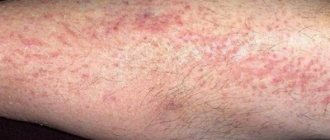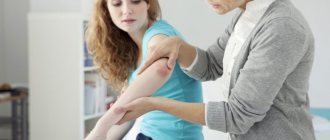Psoriasis on the face is a rare phenomenon that causes not only physical but also psychological discomfort. When the disease is localized on the body, the accompanying rashes can be hidden under clothing so that others do not see them. Patients who suffer from scaly lichen on the face do not have the opportunity to hide obvious defects.
Psoriasis can spread to the face
This problem can be dealt with, but first you need to clearly understand what this skin disease is.
Symptoms of psoriasis on the face: what does the pathology look like?
Signs of the disease and the degree of their severity depend on the stage of development of the disease. There are three stages of psoriasis:
- Initial (progressive). It is characterized by the appearance of small papule-like rashes of light pink color, the diameter of which is 1-3 mm. Over time, the number of papules increases, several elements of the rash merge into so-called plaques, the skin around them turns red and inflamed, the surface of the plaques begins to peel off, and itching appears. You can see what the progressive stage of the disease looks like in the photo of psoriasis on the face.
- Stationary. It is characterized by relative stability: the number of rashes is not replenished with new papules and plaques, and peeling and itching gradually decrease.
- Regressive. This is the so-called quiet period: crusts and plaques separate from the skin, revealing light pink or depigmented areas underneath.
Manifestations of the disease depend not only on the stage, but also on its type. Seborrheic psoriasis on the face, for example, is quite common and causes the patient the greatest psychological discomfort. This form of the disease is accompanied by the appearance of fatty yellowish crusts, localized on the border of the forehead and scalp, and in some cases on the eyebrows.
What contributes to the development of psoriasis
To understand whether psoriasis is contagious or not, let’s consider what can contribute to the development of the disease.
Genetics have a particular influence on lichen planus, namely genes associated with the immune system.
Therefore, if there have been cases of psoriasis in your family, the risk of developing the disease in you and your children is quite high. But hereditary predisposition is not a guarantee that you will definitely get sick.
Despite the fact that diseases such as psoriasis are not transmitted through traditional means (
, through kisses, touches,
How to treat psoriasis on the face with medications?
To obtain positive results and prolong periods of remission, treatment of psoriasis on the face must be comprehensive. It is important to influence not only the skin manifestations of the disease, but also the internal problems that have become the prerequisites for its development.
An important place among medications for the treatment of psoriasis on the face is occupied by ointments, creams, aerosols made on the basis of tar, salicylic acid, zinc, and synthetic analogues of vitamin D3. They reduce inflammation and have a softening and calming effect. The doctor may also recommend potent hormonal ointments and immunosuppressants.
Enterosorbents are prescribed quite often. To increase defenses and speed up recovery, mineral and vitamin complexes are prescribed.
First signs
At the initial stage of development of the disease, experts identify the following main symptoms:
- Formation of stearin stains . They appear at the site of nodules (progressive spots), have a white, golden or silver tint, and are easily removed from the surface of the skin.
- Formation of terminal film . As the disease progresses, when the scales are removed, what remains underneath is not clean skin, but a pink psoriatic plate.
- Pointed bleeding . It accompanies the symptoms listed above. In unsuccessful attempts to scrape off the scales, the already thinned skin is even more damaged. This is accompanied by pinpoint hemorrhage.
Many patients do not pay attention to the primary symptoms, citing an allergic reaction, acne, frostbite and other less dangerous types of rashes.
This way, the most advantageous moment for treatment is missed - the initial stage. The disease starts, its manifestations become more severe, although it would be possible to “get off” with minor losses.
Psoriasis on the face and head: treatment with folk remedies
The use of traditional medicine recipes is justified only if psoriasis is in remission. To treat the acute form of the disease, you need to choose more effective methods prescribed by your doctor.
Before using traditional medicine, be sure to consult your doctor.
Among the remedies used in folk medicine for the treatment of psoriasis on the face are wheatgrass root, corn silk, St. John's wort, elecampane root, burdock, nettle leaves, calamus, etc. The use of baking soda is also widespread: ointments and applications are prepared on its basis , lotions, soda are taken orally.
At-risk groups
The disease is less common in hot countries where solar activity is increased. Children under four years of age are less at risk. According to statistics, the likelihood of developing a lesion increases if you are in a group:
- age - 15-35 years;
- in winter, the incidence of the disease increases;
- in the presence of diseases such as functional impairment of the central nervous system, emotional overload, stress, acute phase of focal infection, cerebral stroke, coronary heart disease, diabetes mellitus, liver disease, metabolic disorders, thyroid diseases;
- taking systemic corticosteroids, lithium salts, adrenergic blockers, interferon, aminoquinoline drugs.
Psoriasis is a chronic disease of a non-infectious nature and cannot be completely cured. But modern therapy methods help slow down its development and reduce the number of periods of exacerbation. The treatment is complex. Medicines, physiotherapy, and cosmetic products are used.
The question of how psoriasis is transmitted remains open. Cases of infection with the disease are unknown to official medicine, but there are various theories, one of which is genetic. This is a generally accepted theory and is considered one of the main factors in the body's tendency to develop the disease. Otherwise, psoriasis is not contagious and this is a proven fact.
Physiotherapy and other treatments for facial psoriasis
In order for traditional drug therapy to give the best results, the treatment of psoriasis on the face is supplemented with physiotherapeutic procedures. The following methods have proven themselves well:
- Irradiation of the affected areas with ultraviolet light. Typically, narrow-band mid-wave irradiation, selective phototherapy, and PUVA therapy are used to target psoriatic plaques.
- Ultrasound treatment. Exposure to sound vibrations, the frequency of which ranges from 800 to 3000 kHz, helps reduce the intensity of the inflammatory process and the resulting skin itching in psoriasis on the face.
- Mud applications. To carry out this procedure, warm healing mud is used, which is applied in a thin layer to the affected areas of the face. It is useful to combine mud applications with swimming in salty estuaries and lakes.
- Electrosleep. Since psoriasis on the face causes significant psychological discomfort to the patient, and intense itching interferes with normal rest, it is useful to conduct electrosleep sessions. This procedure has a powerful sedative effect, helping not only to relax and unwind, but also having a positive effect on the general condition of the body. As a result, prolongation of periods of remission is observed.
Causes and mechanisms of disease development
About 5% of humanity experiences psoriasis. Why does it happen? Considering that this is a systemic disease, it is quite difficult to reliably trace all etiological factors and mechanisms of formation of skin inflammation. There are two main theories describing the process of development of the disease.
According to the first, psoriasis is considered directly as a skin disease in which the function of the epidermis, which is responsible for the formation of cells, is disrupted. In inflamed areas, keratinocyte cells divide too quickly, not having time to mature completely, and the immune system reacts aggressively to this process, which leads to the appearance of plaques.
According to the second theory, psoriasis is considered as an autoimmune disease, in which the primary problem is the immune system, and the accelerated proliferation of keratinocytes is considered as a secondary phenomenon in relation to immune failures.
Care products and facial cleansing for psoriasis
The positive result of therapy largely depends on daily hygiene procedures. During treatment, it is advisable to avoid facial cleansing using aggressive salon peelings and home scrubs. To ensure that the affected areas of the skin are restored as quickly as possible, it is recommended to clean them with special products for sensitive skin prone to dryness and flaking.
La-Cri products are suitable for this purpose, helping to cope with itching and peeling of the affected areas of the face:
- For daily washing, we recommend using a cleansing gel that contains hypoallergenic detergents, walnut and licorice extracts, as well as derivatives of avocado oil and olive oil.
- La-Cri intensive cream for dry skin is well suited to reduce itching and flaking. Thanks to its natural composition, which does not contain parabens, fragrances or hormones, this product can be used for a long period without fear of skin addiction.
Prevention at home
For a patient with psoriasis, it is very important to follow general recommendations for recovery, both during the course of treatment and during especially dangerous seasons when the disease can progress:
- Follow a diet. Do not eat fatty, salty and spicy foods. Do not abuse alcohol.
- Less nervous and worried. Skin is the first indicator of human nervous disorders.
- Do not refuse sanitary-resort treatment. If possible, it is better to take a vacation and relax with health benefits.
- Avoid using hard brushes and sponges. Get a soft sponge and soap with neutral Ph.
- Try not to get too cold to avoid catching viral diseases. An infection in the body can trigger a relapse of psoriasis.
Psoriasis is a rather unpleasant disease that can become dangerous to health if it is not treated in time. At the same time, there are a huge variety of methods for treating this disease: from simple folk recipes to complex physical procedures. In any case, at the first manifestation of the disease, you should immediately consult a doctor.
Clinical researches
The conducted clinical study proves the high efficiency, safety and tolerability of products for daily skin care of children with mild and moderate forms of atopic dermatitis and during remission, accompanied by a decrease in the quality of life of patients. As a result of therapy, a decrease in the activity of the inflammatory process, a decrease in dryness, itching and flaking was noted.
It has been clinically proven that La Cree cream for dry skin eliminates dryness and flaking, retains the skin's own moisture, and protects the skin from wind and cold.
Diagnostics: identifying the type of disease
Correct diagnosis is the way to quickly get rid of rashes . Since there are many types of psoriasis, only a thorough study in several stages will help you choose the right treatment.
Initial examination
The first stage is inspection . It includes:
- Questioning the patient about complaints and symptoms;
- Examination of the face and preliminary determination of the nature of the rash;
- Study of medical history and background diseases.
Are there times when just one initial viewing is enough? The outcome can be different, because sometimes just one photo is enough for a preliminary diagnosis.
Based on the results of the initial examination, the doctor either immediately prescribes treatment or refers to more accurate research methods - instrumental ones.
Instrumental research methods
Such precise methods are necessary to confirm the diagnosis and begin further treatment.
These include:
- Study of peeling (scales) from plaques.
- Biopsy of facial skin.
- Differential diagnosis (for relapse).
Consumer Reviews
Varyagina1 about La-Cri cream for dry skin (vseotzyvy.ru)
"Hi all! Today I want to talk about a wonderful cream from the La Cree brand for dry skin. My son is a teenager. When you have a cold, this happens: you manage to rub your nose so hard that underneath it there is severe irritation, redness, the skin becomes so dry that it cracks, and it’s painful to touch. He walks around with such terrible irritation all day long until we cure him and he stops constantly rubbing his nose. One day a neighbor came to see us on business. But you can’t look at ours without pity, she saw and advised us to try La Cree cream, her son is two years old, they use it all the time. We decided to try it, went to the pharmacy and bought some. And lo and behold, after several days of use, our son’s irritation and redness began to go away, the cream moisturized his dry skin well, and the cracks healed in about two or three days. Now, if problems arise with a runny nose, my son rubs his nose on his own without any whining. Now we always have La Cree cream in our home medicine cabinet.”
Verochka about La-Cri cream for dry skin (babyblog.ru):
“La Cree produces a very good cream for dry skin. My skin is normal, dryness appears only after a shower, but I still use creams that intensively nourish and saturate the skin. La Cree is one of my favorites. I also love it for its composition, it is absolutely natural, plus there are components that are very rare in principle, for example, beeswax. But the coolest thing about it, of course, is the smell. So pleasant, soothing, just lovely. I apply it before bed and, it seems to me, I even sleep better).”
Sources:
- Molochkova Yulia Vladimirovna, Dermatology. Brief reference book, GEOTAR-Media, 2021.
- Baumann Leslie, Cosmetic Dermatology. Principles and practice, MEDpress-inform, 2021.
- Ratner Desiri, Avram M.R., Avram M.M., Procedures in Dermatology. Clinical cosmetology, GEOTAR-Media, 2021.
